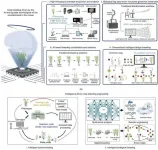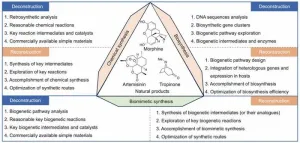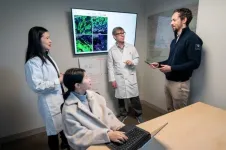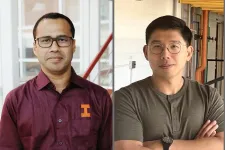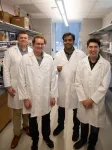(Press-News.org)
A new study published in Engineering explores how next-generation artificial intelligence (AI) and big data are revolutionizing crop breeding, with potential far-reaching implications for global food security.
Crop breeding has come a long way, evolving through distinct stages from domestication breeding to the current era of big data intelligent design breeding. The latest stage, “Breeding 4.0,” integrates biotechnology, big data, and AI. This convergence aims to achieve efficient, personalized breeding of new crop varieties, marking a significant shift from traditional “scientific” to “intelligent” breeding approaches.
One of the key applications of AI and big data in crop breeding is high-throughput phenotyping. Traditional methods of trait acquisition were limited, but new phenotyping equipment systems, leveraging sensors and AI, can now collect high-throughput, automated phenotypic data. For example, high-resolution UAV photography can identify various crop traits, and advanced platforms can conduct continuous nondestructive testing under adverse conditions. This not only improves the efficiency and precision of trait acquisition but also helps in identifying stress resistance genes, promoting intelligent and precise breeding.
Multiomics databases and management systems have also been crucial in this transformation. These databases integrate various omics data, offering a more comprehensive view of genetic variation. For instance, databases like ZEAMAP for maize and SoyMD for soybean provide rich data resources for researchers to mine candidate genes and understand genetic regulatory mechanisms.
AI-based integrated multi-omics analysis is another significant advancement. By analyzing complex genetic regulatory networks, scientists can better understand crop traits. A research team from Huazhong Agricultural University constructed a multi-omics integrated network map for maize, accurately predicting important functional genes and regulatory pathways. This approach accelerates gene function discovery and helps in constructing precise regulatory network models.
The development of AI-powered breeding software tools further accelerates crop improvement. These tools, integrate big data and AI to optimize breeding decisions, shorten breeding cycles, and improve selection accuracy.
However, China’s seed industry technology development still lags behind international leaders in several aspects. Although China has made progress in germplasm resource identification and digital transformation of breeding, there are gaps in scientific innovation, core technologies, intelligent breeding systems, germplasm resource utilization, and market competitiveness.
To address these challenges, the study proposes a focus on developing automated intelligent crop phenotype acquisition technology, advancing information fusion mechanisms, and creating omics big data analysis algorithms. By 2040, China aims to develop frontier core technologies, establish a precision breeding decision system, and transform its seed industry through multidisciplinary integration, data-driven precision breeding, and collaborative innovation platform construction.
This research provides valuable insights into the future of crop breeding. As AI and big data technologies continue to evolve, they will likely play an even more significant role in ensuring global food security by enabling more efficient and sustainable crop breeding practices.
The paper “Revolutionizing Crop Breeding: Next-Generation Artificial Intelligence and Big Data-Driven Intelligent Design,” authored by Ying Zhang, Guanmin Huang, Yanxin Zhao, Xianju Lu, Yanru Wang, Chuanyu Wang, Xinyu Guo, Chunjiang Zhao. Full text of the open access paper: https://doi.org/10.1016/j.eng.2024.11.034. For more information about the Engineering, follow us on X (https://twitter.com/EngineeringJrnl) & like us on Facebook (https://www.facebook.com/EngineeringJrnl).
END
In a recent publication in Engineering, researchers from Jinan University in China and the University of Illinois Chicago in the US presented an in-depth perspective on the biomimetic synthesis of natural products. This research area, which bridges chemistry, biology, and pharmacy, has seen significant progress in recent years.
Natural products are crucial in drug discovery, providing essential scaffolds for developing new medications. However, obtaining sufficient quantities of these compounds for research and production is challenging due to resource limitations. Traditional chemical synthesis and biosynthesis methods also face their own set of ...
Tokyo, Japan – A team led by a member of Tokyo Metropolitan University have made advances in the search for dark matter, observing galaxies using new spectrographic technology and the Magellan Clay Telescope. With a mere 4 hours of observations, precise measurements in the infrared range have set new limits on the lifetime of dark matter. Their findings highlight the crucial utility of their technology and extend the search to less explored parts of the spectrum.
Over the past century, cosmologists have grappled with an apparent inconsistency in what they saw in the universe. Observations of the rotation of galaxies, for example, imply that there is a lot of mass out ...
WASHINGTON– The Society for Cardiovascular Angiography & Interventions (SCAI) today expressed profound disappointment in the American Board of Medical Specialties (ABMS) decision to deny the creation of the American Board of Cardiovascular Medicine (ABCVM).
The ABCVM was proposed by SCAI, the American College of Cardiology (ACC), the American Heart Association (AHA), the Heart Failure Society of America (HFSA), and the Heart Rhythm Society (HRS) as a necessary step to establish cardiology as its own distinct medical specialty, separate from internal ...
In the race to meet the growing global demand for lithium — a critical component in batteries for electric vehicles — a team of researchers from Rice University’s Elimelech lab has developed a breakthrough lithium extraction method that could reshape the industry.
In their study published in Science Advances, the researchers demonstrated near-perfect lithium selectivity by repurposing solid-state electrolytes (SSEs) as membrane materials for aqueous lithium extraction. While originally designed for the rapid conduction of lithium ions in solid-state batteries — where there are no other ions or liquid solvents — the highly ordered and confined structure ...
American Board of Cardiovascular Medicine Chair Jeffrey Kuvin, MD, issued the following statement in response to the American Board of Medical Specialties denial of an independent board for cardiology:
“We are deeply disappointed with the American Board of Medical Specialties’ decision not to approve the American Board of Cardiovascular Medicine as a new, independent board for cardiology.
The decision ignores the evolution of cardiovascular medicine into its own distinct medical specialty, separate from the field of internal medicine, requiring its own set of knowledge, skills, and competencies to sustain professional excellence and effectively ...
Neuroblastoma is a solid tumor that occurs in children. When high-risk, the disease has a poor prognosis. Decades ago, adding the drug retinoic acid to neuroblastoma treatment increased survival by 10-15%. However, this effect was only evident in post-chemotherapy consolidation after bulky primary tumors had largely been eliminated. Why retinoic acid is effective in this setting but not against primary tumors, has been speculated about for nearly 50 years. St. Jude Children’s Research Hospital scientists resolved the mystery in a new study, showing retinoic acid uses a novel mechanism to kill metastasized neuroblastoma. The drug “hijacks” ...
COLUMBUS, Ohio – Novel technology intends to redefine the virtual reality experience by expanding to incorporate a new sensory connection: taste.
The interface, dubbed ‘e-Taste’, uses a combination of sensors and wireless chemical dispensers to facilitate the remote perception of taste – what scientists call gustation. These sensors are attuned to recognize molecules like glucose and glutamate — chemicals that represent the five basic tastes of sweet, sour, salty, bitter, and umami. Once captured via an electrical signal, that data is wirelessly passed to a remote device for replication.
Field ...
URBANA, Ill. – Nanozymes are synthetic materials that have enzyme-like catalytic properties, and they are broadly used for biomedical purposes, such as disease diagnostics. However, inorganic nanozymes are generally toxic, expensive, and complicated to produce, making them unsuitable for the agricultural and food industries. A University of Illinois Urbana-Champaign research team has developed organic-material-based nanozymes that are non-toxic, environmentally friendly, and cost effective. In two new studies, they introduce ...
ITHACA, N.Y. – When people go along with opinions that go against their better judgment, they feel more culpable for the decision if things go wrong than if they hadn’t received another opinion, new research from Cornell University finds.
The effect may seem counterintuitive, but going against one’s better judgment increases thoughts about better decisions that could have been made, which amplify feelings of control over the situation.
“If you have another person in the ...
HOUSTON – (Feb. 28, 2025) – A team of researchers at the George R. Brown School of Engineering and Computing at Rice University has developed an innovative artificial intelligence (AI)-enabled, low-cost device that will make flow cytometry ⎯ a technique used to analyze cells or particles in a fluid using a laser beam ⎯ affordable and accessible.
The prototype identifies and counts cells from unpurified blood samples with similar accuracy as the more expensive and bulky conventional flow cytometers, provides results within minutes and is significantly cheaper and compact, making it highly attractive for point-of-care clinical ...
